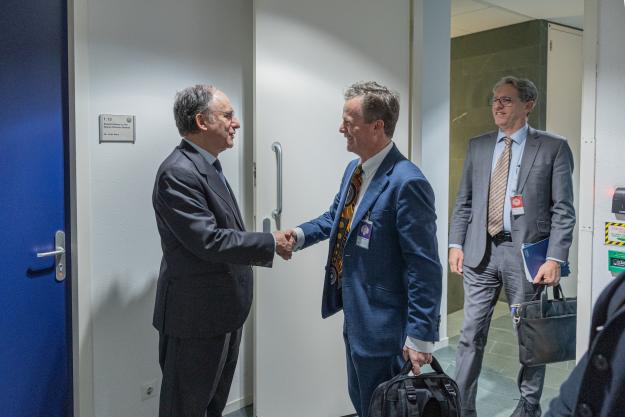
Ambassador Fernando Arias, Director-General of the OPCW, meets with Mr Craig Everton, Assistant Secretary in the Australian Safeguards and Non-Proliferation Office (ASNO)
THE HAGUE, Netherlands—19 December 2023— The Director-General of the Organisation for the Prohibition of Chemical Weapons (OPCW), Ambassador Fernando Arias, and Mr Craig Everton, Assistant Secretary at Australia’s Safeguards and Non-Proliferation Office (ASNO) at the Department of Foreign Affairs and Trade, had a bilateral meeting on 5 December 2023 at the Organisation’s Headquarters in The Hague.
During the meeting, the Director-General and Assistant Secretary Everton discussed various challenges related to the implementation of the Chemical Weapons Convention in the current challenging political environment. In this regard, Ambassador Arias underlined the importance of addressing the threat of chemical weapons use to bolster peace and international security.
Furthermore, the Director-General briefed Assistant Secretary Everton on OPCW’s Organisational priorities following the end of destruction of all declared chemical weapons stockpiles achieved in July this year: “Preventing the re-emergence of chemical weapons will remain a key priority for the Organisation. In this context, it is imperative that we monitor developments in science and technology and ensure that we can address the challenges and take advantage of the opportunities emerging from rapid advancements in this field.”
“The OPCW Centre for Chemistry and Technology is an important tool for the Organisation to keep pace with scientific and technological progress. The Centre is also instrumental in enhancing OPCW’s capacity building activities and international cooperation programmes for Member States,” the Director-General added.
“As Australia’s independent regulatory authority for CWC implementation for over 25 years, ASNO recognises the central role of science in providing confidence to verification. I was very impressed by the new ChemTech Centre facilities and how these can both support States Parties capacity building and maintaining the cutting-edge scientific capabilities of the OPCW inspectorate,” said Assistant Secretary Everton.
Background
Australia has been an active member of the OPCW since the Chemical Weapons Convention entered into force in 1997.
To date, Australia has made voluntary contributions totalling €1,866,530 to six different OPCW trust funds, including the Trust Fund for the Implementation of Article X, the Trust Fund for a Centre for Chemistry and Technology, and Trust Fund for Syria Missions.
The OPCW Centre for Chemistry and Technology (ChemTech Centre), which was inaugurated on 12 May 2023, enhances the OPCW’s ability to conduct chemical research and analysis. This significantly reinforces the Organisation’s verification regime and inspection capabilities of chemical industries around the world. In addition, an increasing number of capacity building activities are being delivered through the Centre, including chemical emergency response trainings and analytical skills development courses for experts from Member States.
As the implementing body for the Chemical Weapons Convention, the OPCW, with its 193 Member States, oversees the global endeavour to permanently eliminate chemical weapons. Since the Convention’s entry into force in 1997, it is the most successful disarmament treaty eliminating an entire class of weapons of mass destruction.
On 7 July 2023, the OPCW verified that all chemical weapons stockpiles declared by the 193 States Parties to the Chemical Weapons Convention since 1997 — totalling 72,304 metric tonnes of chemical agents — have been irreversibly destroyed under the OPCW’s strict verification regime.
For its extensive efforts in eliminating chemical weapons, the OPCW received the 2013 Nobel Peace Prize.
